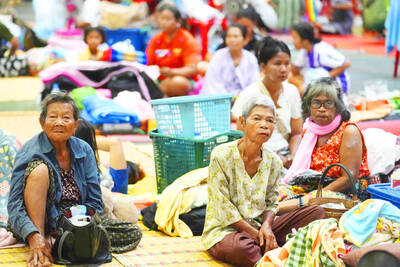Japan said yesterday it “cannot accept” China’s development of a gas field near a disputed part of the East China Sea after Beijing insisted it was acting within its own waters.
Asia’s two largest economies struck a deal in June last year to end a lingering spat over Chinese undersea gas fields which, Japan said, may extend into its exclusive economic zone.
But Japan has complained about China’s development of the nearby Tianwaitian gas field, which Tokyo contends should be untouched until talks settle its status.
“The area should be under negotiations. The Japanese government expresses its regret that China is unilaterally developing the field,” Japanese Chief Cabinet Secretary Takeo Kawamura told reporters.
“Japan cannot accept China’s unilateral development,” he said.
Under last year’s deal, Japan agreed to invest in one field in the area, and jointly develop another.
The June agreement stipulated that the two nations would continue talks over other gas fields. But China continues to insist that it has the right to develop them.
The Tianwaitian field was not specifically mentioned in the June agreement but Japan contends it is part of further negotiations.
“Our understanding is that the status of the ones outside of the political agreement is blank. Therefore the status quo is the way it should be,” Kawamura said.
“We are gathering information at this point. We must take appropriate actions if new steps are made,” he said.
Japanese Foreign Minister Hirofumi Nakasone confirmed press reports that Japan has made an official protest to China.
“This is extremely regrettable. We have issued protests to the Chinese side,” Nakasone said.
China however said on Sunday the development was in “China’s undisputed territorial waters.”
“The gas field development activities of the Chinese side are being carried out within China’s inherent sovereign rights,” Chinese Foreign Ministry spokesman Qin Gang (秦剛) said in a statement on his ministry’s Web site.
Japan and China are two of the world’s biggest energy importers. They have been working since 2006 to repair relations, which have long been tense due in part to the legacy of Japanese imperialism.

FOREST SITE: A rescue helicopter spotted the burning fuselage of the plane in a forested area, with rescue personnel saying they saw no evidence of survivors A passenger plane carrying nearly 50 people crashed yesterday in a remote spot in Russia’s far eastern region of Amur, with no immediate signs of survivors, authorities said. The aircraft, a twin-propeller Antonov-24 operated by Angara Airlines, was headed to the town of Tynda from the city of Blagoveshchensk when it disappeared from radar at about 1pm. A rescue helicopter later spotted the burning fuselage of the plane on a forested mountain slope about 16km from Tynda. Videos published by Russian investigators showed what appeared to be columns of smoke billowing from the wreckage of the plane in a dense, forested area. Rescuers in

‘ARBITRARY’ CASE: Former DR Congo president Joseph Kabila has maintained his innocence and called the country’s courts an instrument of oppression Former Democratic Republic of the Congo (DR Congo) president Joseph Kabila went on trial in absentia on Friday on charges including treason over alleged support for Rwanda-backed militants, an AFP reporter at the court said. Kabila, who has lived outside the DR Congo for two years, stands accused at a military court of plotting to overthrow the government of Congolese President Felix Tshisekedi — a charge that could yield a death sentence. He also faces charges including homicide, torture and rape linked to the anti-government force M23, the charge sheet said. Other charges include “taking part in an insurrection movement,” “crime against the

POINTING FINGERS: The two countries have accused each other of firing first, with Bangkok accusing Phnom Penh of targeting civilian infrastructure, including a hospital Thai acting Prime Minister Phumtham Wechayachai yesterday warned that cross-border clashes with Cambodia that have uprooted more than 130,000 people “could develop into war,” as the countries traded deadly strikes for a second day. A long-running border dispute erupted into intense fighting with jets, artillery, tanks and ground troops on Thursday, and the UN Security Council was set to hold an emergency meeting on the crisis yesterday. A steady thump of artillery strikes could be heard from the Cambodian side of the border, where the province of Oddar Meanchey reported that one civilian — a 70-year-old man — had been killed and

POLITICAL PATRIARCHS: Recent clashes between Thailand and Cambodia are driven by an escalating feud between rival political families, analysts say The dispute over Thailand and Cambodia’s contested border, which dates back more than a century to disagreements over colonial-era maps, has broken into conflict before. However, the most recent clashes, which erupted on Thursday, have been fueled by another factor: a bitter feud between two powerful political patriarchs. Cambodian Senate President and former prime minister Hun Sen, 72, and former Thai prime minister Thaksin Shinawatra, 76, were once such close friends that they reportedly called one another brothers. Hun Sen has, over the years, supported Thaksin’s family during their long-running power struggle with Thailand’s military. Thaksin and his sister Yingluck stayed